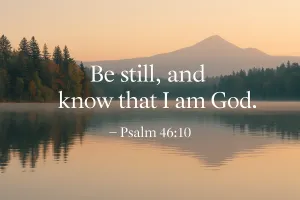How to Be Still and Hear God’s Voice in Stressful Times
“Be still, and know that I am God.” – Psalm 46:10 (KJV)

When life feels overwhelming, this verse often comes to mind as a call to quiet prayer. However, in its original context, Psalm 46:10 is much more than that—it’s a command spoken into chaos. Nations were in turmoil, wars raged, and the earth itself shook. In the middle of all this, God declared: Stop. Cease striving. Let go. Remember who I am.
The Meaning of “Be Still”
The Hebrew word translated “be still” is rapha, which means to let go or to cease striving. God doesn’t simply ask us to sit quietly—He invites us to release control and trust Him completely.
As a result, when we let go, we come to “know that I am God.” That kind of knowing doesn’t come through effort but through surrender. It means moving from worry to worship, from anxiety to assurance.
Andrew Wommack’s commentary explains it this way: the stillness here is not passive—it’s active trust. In other words, we choose to stop wearing ourselves out with fear and rest in God’s power and presence.
A Personal Experience of Stillness
One morning, the words “Psalm 46:10” kept running through my mind. Even though I had read the verse before, I couldn’t recall it clearly. When I looked it up, I decided that day to literally sit totally still for one hour.
I sat on the patio, and what happened amazed me. Ants crawled through the grass, the wind rustled the trees, and deer walked right up to me because I wasn’t moving. For the first time in a while, I noticed sounds and scents I usually ignored in the rush of daily life.
That moment showed me something powerful: one way to “be still” is to slow down enough to notice God’s hand in the ordinary. His work always surrounds us, but too often, we stay too busy to see it. Stillness opens our eyes. For example, as Jesus warned in Mark 4:19, the cares of this world can choke out what God is doing. Yet when we pause, we see Him more clearly.
Shifting Perspective
Another truth I sense God speaking is this: walking in His love means looking at life from someone else’s perspective. Everyone has a story. Each person carries unseen struggles—health problems, financial burdens, family challenges, or silent grief.
The question is simple: If I were in their shoes, what would I want someone to do for me?
Sometimes the answer is just to care. At other times, it’s to pray. Often, it’s as simple as being present and reminding someone that they are not alone.
Scripture calls us to this kind of compassion: “Be ye therefore followers of God, as dear children.” – Ephesians 5:1 (KJV)
Everyday Reminders
As I sat still, two sounds spoke to me deeply:
-
An airplane overhead – a reminder that people constantly move from one place to another. Some travel for business, others for vacation, some to visit a sick loved one, and some perhaps even to attend a funeral. Whatever the reason, their lives intersect with others. No journey happens in isolation.
-
A siren in the distance – a reminder that someone, somewhere, urgently needed help. Whether illness, an accident, or trouble that led them to call for help, God knew every detail.
Together, these simple moments strengthened my trust: I can’t control what others face, but God can. My role is to care, to pray, and to rest in Him.
Closing Thought
Psalm 46:10 teaches us that the greatest act of faith isn’t always doing more—it’s letting go. Instead, we find God’s presence most real in stillness.
If you feel hurt, overwhelmed, or desperate for answers, let this truth sink in: God’s power doesn’t shrink in your chaos. His love never bends to your circumstances. In fact, it’s often in the stillness, when you let go, that you come to know Him most deeply.